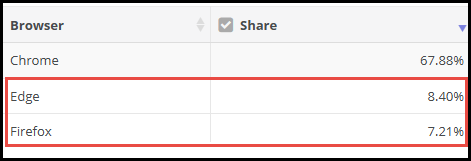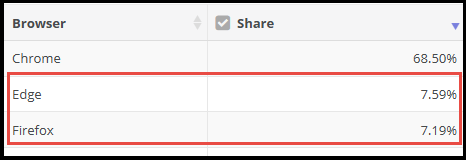Back in February, we reported that Edge was edging closer to Firefox in the desktop browser market share with numbers for January showing Edge at just a single percentage point behind Firefox. I said in that article… ”I don’t believe it will be too long before Edge overtakes Firefox’s market share”. Well, it wasn’t too long indeed, Edge actually moved past Firefox into second place during March and consolidated that position through April:
Desktop Browser Market Share
As at 30th April 2020

(credit NetMarketShare)
Of course, Chrome still remains way out in front as the number one desktop browser globally but Microsoft’s Edge is definitely gaining traction. I seriously doubt we’ll ever see Edge attain the old Internet Explorer’s dominant market share but I wouldn’t be at all surprised to see Edge continuing to close the gap on Chrome as the year rolls on.
Edge has the obvious advantage of being built into Windows 10 but Microsoft’s transition to the Chromium base has also proved to be a shrewd move eliminating most, if not all, of the complaints regarding the old version of Edge running on Microsoft’s own engine. With improved compatibility, speed, and a much larger range of extensions now available, Edge has finally come of age.
Microsoft is continuing to build more features into Edge and, along with existing innovations such as Profiles, Immersive Reader Mode, Read Aloud, Collections, Tracking Prevention, and syncing across all devices, it isn’t difficult to see why the new Edge is proving to be a popular choice. Chromium Edge for mobile is also proving to be popular among Android and iOS users with the mobile browser attracting glowing reviews and rating 4. 5 stars overall on both platforms.
Edge’s growing popularity also consolidates Chromium’s foothold on the web and this, in my opinion, represents the greatest threat to Firefox and other non-Chromium browsers. If the trend continues, it may well lead to website developers optimizing sites for Google’s engine rather than building truly browser-independent sites, and that would not be a good outcome for Firefox users.
- Further Reading: “Read Aloud” Webpage Reader In Chromium Edge
—



I enjoy these stats Jim as they reflect true market trends. Your projection is most likely correct as Microsoft is constantly fixing (patching) Edge and sharing this information. My concern is over who is looking after the updates, Mindblower!
Firefox has a feature (uniquely?) I find indispensable: letting me put shortcuts to up to 16 “top sites” (favorite sites) on the home page.
Chrome can let us start a large number of sites when the browser opens, each in its own tab, but each tab takes a lot of memory. I’d rather open only what I need.
Finally, and based just on the seat of my pants, FF seemed faster than Chrome last time I compared them.
At least that’s why I switched to Firefox a half year ago.
I worry that it will one day lose its open source support and disappear.
Hey Steve,
Not so unique Steve. I know of at least 2 other browsers that include a very similar feature, Opera and Chromium Edge. I use the Opera feature myself but have not yet checked out this feature in Chromium Edge which is called “Collections”. If you search online for “Edge collections” you should find more information.
I completely understand your fondness for Firefox, I am the same. However, I’m finding Firefox is failing to render more and more webpages correctly.
Cheers… Jim
Don’t worry Firefox is still King in Linux World.
How big is Linux in the overall scheme of things?
There are currently around 500 Linux distros in active development. According to the latest NetMarketShare statistics, those 500 distros in total account for 1.89% of the desktop operating system market. Windows is at 88.14% and Mac OS at 9.38%.